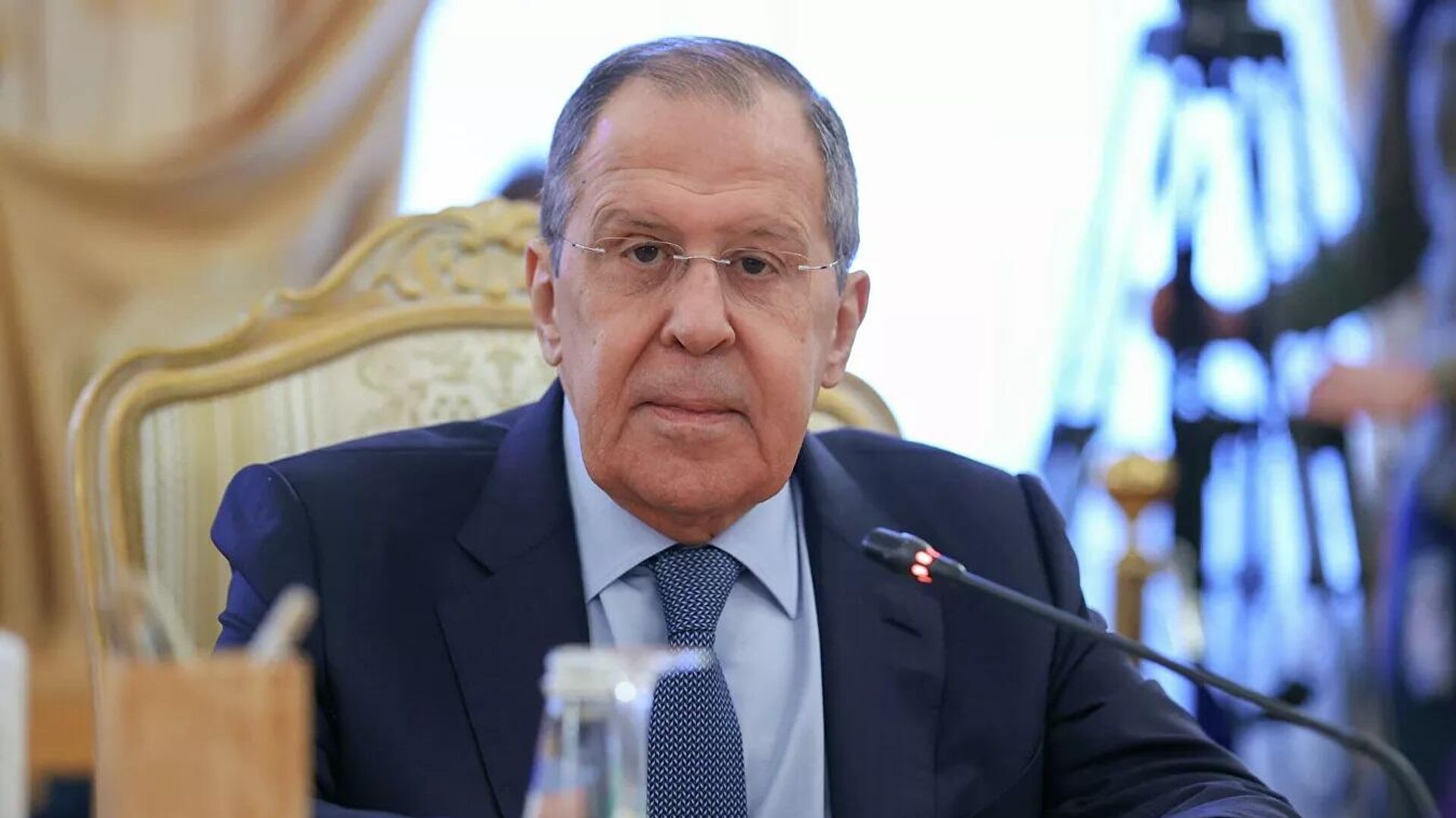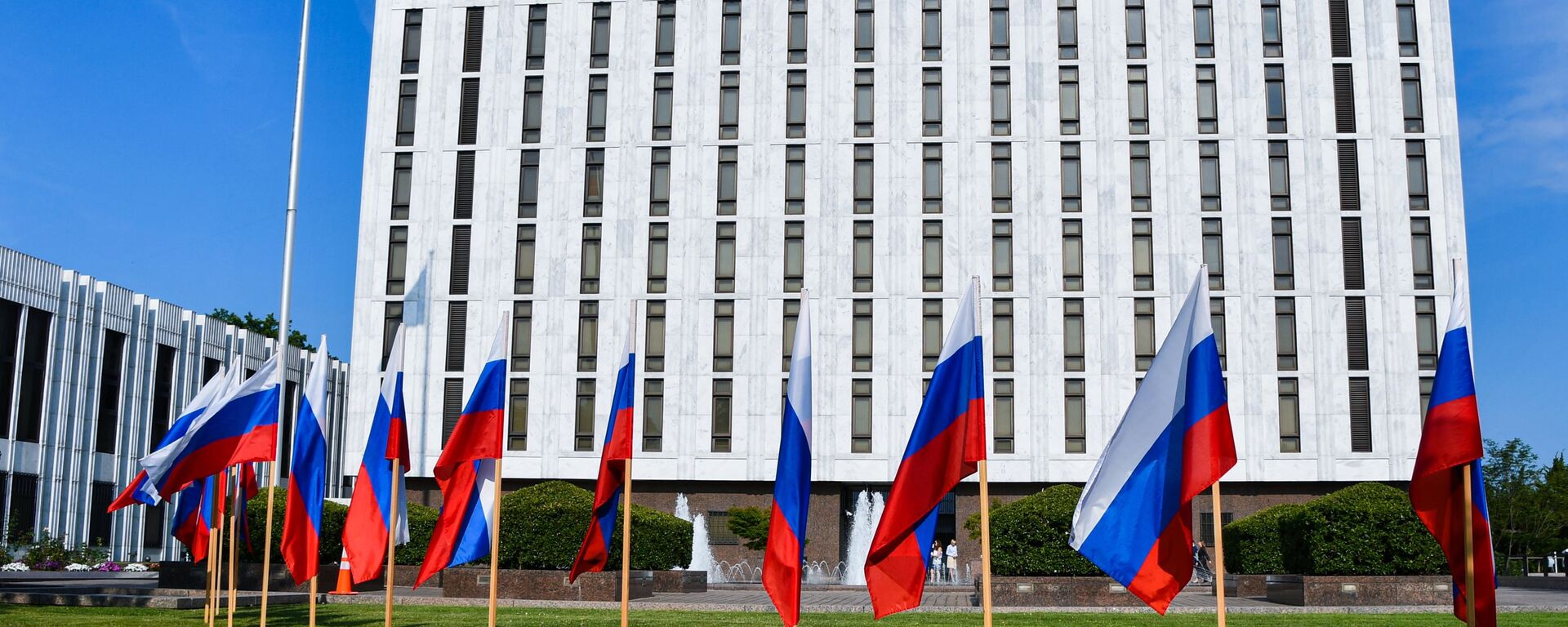https://sputnikglobe.com/20220128/war-danger-boorish-diplomacy-and-uss-cossacks-in-europe-best-bits-from-lavrovs-big-interview-1092581152.html
War Danger, Boorish Diplomacy, and US’ ‘Cossacks in Europe’: Best Bits From Lavrov’s Big Interview
War Danger, Boorish Diplomacy, and US’ ‘Cossacks in Europe’: Best Bits From Lavrov’s Big Interview
Sputnik International
The Russian foreign minister sat down with the heads of four major Russian radio stations on Friday to discuss the pressing international issues of the day... 28.01.2022, Sputnik International
2022-01-28T14:49+0000
2022-01-28T14:49+0000
2022-10-19T19:37+0000
sergey lavrov
russia
ukraine
rt
diplomacy
nato
interviews
https://cdn1.img.sputnikglobe.com/img/07e6/01/1c/1092580026_0:0:1350:759_1920x0_80_0_0_197717a2c1e4e14fdbaccb9e86f9476e.jpg
War With US?There will be no war between Russia and the United States, at least if it is up to Russia to decide, Foreign Minister Sergei Lavrov has assured.Discussions regarding the US' formal written response to Russia's security proposals are still ongoing, Lavrov said. “The Western-style responses muddy the waters, but there are rational points there on secondary issues,” he noted.These secondary points include a number of proposals to prevent conflict, deescalate, and engage in confidence-building, and all of them were previously rejected by the US side over the past three years, according to the foreign minister. “In other words, the constructive elements contained in the reply is in fact borrowed from recent Russian initiatives. At least it’s something,” the foreign minister quipped.Lavrov emphasised that Moscow’s security proposals – which include a series of measures aimed at easing tensions between Russia and the Western bloc – as well as a firm demand that Ukraine not be allowed to join NATO, do not constitute an ultimatum, and do not contain any unreasonable requests. The US and its allies have spent months now accusing Russia of plans to "invade" Ukraine. Moscow has vocally denied these claims.Western ‘Incantations’ About Open DoorsIn their public remarks on Russia's security proposals, Western officials have repeatedly claimed that Moscow cannot decide for Kiev on what alliances the country can join, citing Organisation for Security Co-operation in Europe (OSCE) agreements. Russia takes a broader, more comprehensive view of these treaties, Lavrov indicated.“In 2010 in Astana, and before that in 1999 in Istanbul, all of the presidents and prime ministers of the OSCE countries signed a package of agreements which contained interrelated principles for ensuring the indivisibility of security. The West pulls out only one phrase from this package – that ‘each country has the right to choose its allies, to choose its military alliances’, but there is also a right stipulating the obligation of each country not to strengthen its security at the expense of the security of others,” the foreign minister said.Lavrov informed that Russia is preparing to send its US and NATO colleagues a formal request for clarification later Friday asking them to explain how they are going to fulfil their obligations under the OSCE treaties.“It’s just that their position is based on false arguments, on a direct misinterpretation of the facts, while ours is based on what everyone signed up for. And here I don’t see any room for compromise. Otherwise what is there to negotiate if the West openly sabotages the old decisions and misinterprets them? This will be a key test for us,” Lavrov summed up.NATO’s ‘Shameful’ ReplyNATO also sent a formal written response to Russia's security proposals on Wednesday. Lavrov characterised it as much more ideological than that of the Americans, to the point where Washington’s letter constituted a “model of diplomatic decency” by comparison.Ukraine TensionsLavrov indicated that when it comes to the Ukraine crisis, Moscow continues to hold to its firm position that Kiev must implement the political portion of the Minsk Agreements, which would end the war in the Donbass, ease regional tensions and serve to guarantee Ukraine’s territorial integrity.“The issue of recognition [of the Donetsk and Lugansk republics] should be considered in the context of our firm position to force the West to push Kiev to implement with the Minsk Agreements. Then everything will be fine,” Lavrov said.The foreign minister believes that only the United States could force Kiev to implement the treaty. President Biden even offered to “help implement” the Minsk agreements at his meeting in Geneva with President Putin last June, Lavrov said.Signed in the Belarusian capital of Minsk in February 2015, the Minsk Agreements called for an immediate ceasefire in the civil conflict in eastern Ukraine, demanded the pullback of forces and heavy weapons from the line of contact, and called on Kiev to implement legal reforms which would grant its eastern regions significant autonomy.The Russian diplomat accused the West of “hysterically inflating” tensions around Ukraine, to the point where even Ukrainian officials themselves have begun trying to pump the breaks.This fearmongering has become so “frank and cynical in its use of Ukraine against Russia that the regime in Kiev has become frightened. They are already saying that there is no need to exacerbate this discussion so much, talking about reducing the rhetoric, asking the West why it is evacuating its diplomats,” Lavrov noted.The Russian diplomat emphasised, however, that he said nothing "threatening" regarding Ukraine to his US counterpart Antony Blinken at their recent meeting in Geneva, after which the US side announced its diplomatic evacuation. “I didn’t tell him anything. I assure you that we discussed only the security guarantees, and after that I raised the completely unacceptable situation regarding our diplomatic missions,” Lavrov said.Washington’s Ukrainian ‘Cossacks in Europe’The Russian foreign minister accused Washington of “using” Kiev to project American interests in Europe, and stressed that Ukraine’s leaders are always welcome to come to Russia for talks if they want to try to improve bilateral relations.He noted that President Zelensky is free to visit Russia if he wants to start a dialogue about normalizing relations, whether these take place in Moscow, St. Petersburg, Sochi or elsewhere. He added however that if the Ukrainian president wants to discuss Donbass, he should speak to the Donbass republics directly through the contact group. “When he says that he won’t talk to them, that’s bad. This is bad for the intra-Ukrainian crisis, and for our relations,” Lavrov stressed.New Warning Regarding New SanctionsNew sanctions against Russia would be contrary to the West's own interests, Lavrov indicated.“As far as the threat of sanctions is concerned: The US has been informed in the course of discussions between [Presidents Putin and Biden] that the package of measures which has now been mentioned about the complete shutdown of financial and economic systems controlled by the West would be considered tantamount to breaking off relations. This was said directly, and I think they understand this,” the Russian foreign minister stressed. “I don’t think that this would be in anyone’s interests,” he added.Earlier this month, US media reported on the introduction of legislation in Congress aimed at "collapsing" the Russian economy, including new restrictions on the Russian banking sector, personal sanctions against military and government officials, prohibiting transactions involving Russian sovereign debt, and potentially cutting the country off from the SWIFT interbank transfer system.In a moment of levity during the sanctions discussion, after being informed that the US was “even” considering restrictions against Lavrov personally, the foreign minister quipped: “What do you mean ‘even’ me? What, am I not worthy of sanctions?”Washington’s ‘Boorish’ Behaviour Toward Russian DiplomatsLavrov also discussed difficulties that Russian diplomats have experienced in dealing with their US counterparts in recent years, recalling an undiplomatic incident that took place a couple of years ago, when, in a private conversation, an assistant to then-US Secretary of State Mike Pompeo told Lavrov’s deputy that Pompeo had mentioned a scheme to ‘optimize’ the work of diplomats, with the US reportedly considering reducing the terms of service of foreign diplomats to three years.“To the question on why this was being announced on the sly, and whether there were similar deliberations regarding countries besides Russia, we were told ‘no’, that no other countries were considered for such an experiment, only the Russian Federation. It was then that another round of diplomatic head-butting began,” Lavrov revealed.Antonov did end up leaving Washington temporarily due to a separate diplomatic flap in March of 2021 over a controversial interview with President Biden to ABC News in which the US leader agreed with the characterization of President Putin as “a killer” and threatened to make Moscow “pay a price” for its alleged meddling in US elections.Commenting on the ongoing dispute between Russia and the US regarding diplomatic property and the number of diplomatic personnel stationed in each country, Lavrov promised that a meeting on the matter would be held within the next couple of weeks.“We propose a reset for everything – starting with the ugly and petty move by Nobel laureate [Barack] Obama, to annul everything starting with that move and from what followed,” Lavrov said, referring to the former US president’s decision to kick out 35 Russian diplomats out of the US in late 2016 in response to claims of Russian election meddling.Ties With Latin AmericaLavrov stressed that Moscow would continue to engage with and build relations with Latin American nations, no matter how the talks with the West on Russia’s security proposals turn out.Earlier, US media ramped up fears that Russia might put military bases or even nuclear-tipped missiles in the Western Hemisphere, with these reports prompting US Ambassador to the United Nations Linda Thomas-Greenfield to warn that “such an aggressive action against the United States” would elicit “a strong response” from Washington.Navalny SagaLavrov weighed in on the saga surrounding Alexei Navalny – the Russian opposition vlogger whose alleged poisoning sparked a new escalation of tensions between the West and Moscow in 2020. Moscow, he said, still has a series of unanswered questions regarding the incident.“There are a lot of interesting elements there,” he noted, pointing out, for example, that Navalny was visited by US intelligence officers during his stay in the Berlin hospital.As for broader Western allegations against Russia regarding Navalny’s alleged “poisoning,” Lavrov said that he believes that “so far… the West has no cause to blame us,” and that the poisoning saga was started artificially as a deliberate provocation.Human Rights Court SpatIn recent weeks, the European Court of Human Rights and Russia have engaged in multiple spats on a range of issues, including Moscow's decision to close down human rights NGO "Memorial," the MH17 case, a Ukrainian case about Russia's alleged "abduction of children" from the Donbass, and other problems. Lavrov commented on these developments by suggesting that unfortunately, in his estimation, the court has lost its ability to make objective judgements.“Over the past few years, Russia has raised the question of materializing the statutory provision [on a commission of human rights], and there was general agreement to start work on such a commission, as well as a common understanding that we would primarily deal with human rights issues in the Commonwealth of Independent States area, so that we ourselves, all CIS countries, and not some Western structures, like the ECHR, would rule on these subjects. Because the EHCR lost its ability to rely on the principles of justice a long time ago, and politicises its decisions more and more with each passing year, in my opinion,” Lavrov said.
https://sputnikglobe.com/20220125/ukraines-defence-minister-slams-foreign-media-for-whipping-up-russian-invasion-fears-1092512473.html
https://sputnikglobe.com/20220112/us-democratic-senators-suggest-sanctions-on-russias-banking-sector-under-ukraine-defending-act-1092211046.html
https://sputnikglobe.com/20210625/us-not-going-to-return-seized-diplomatic-property-to-russia-ambassador-antonov-says-1083242623.html
https://sputnikglobe.com/20220118/us-warns-of-strong-response-if-russia-tries-to-intimidate-washington-with-nukes-in-latin-america-1092349826.html
ukraine
Sputnik International
feedback@sputniknews.com
+74956456601
MIA „Rosiya Segodnya“
2022
News
en_EN
Sputnik International
feedback@sputniknews.com
+74956456601
MIA „Rosiya Segodnya“
Sputnik International
feedback@sputniknews.com
+74956456601
MIA „Rosiya Segodnya“
sergey lavrov, ukraine, rt, diplomacy, nato, interviews
sergey lavrov, ukraine, rt, diplomacy, nato, interviews
War Danger, Boorish Diplomacy, and US’ ‘Cossacks in Europe’: Best Bits From Lavrov’s Big Interview
14:49 GMT 28.01.2022 (Updated: 19:37 GMT 19.10.2022) The Russian foreign minister sat down with the heads of four major Russian radio stations on Friday to discuss the pressing international issues of the day, chief among them the continued escalation of tensions between Moscow and the West over Ukraine.
There will be no war between Russia and the United States, at least if it is up to Russia to decide, Foreign Minister Sergei Lavrov has assured.
“If it’s up to the Russian Federation, there will be no war. We do not want wars. But we won’t allow the West to grossly ignore our interests, either,” Lavrov said, answering a question from Sputnik and RT Editor-in-Chief Margarita Simonyan during his big interview.
Discussions regarding the US' formal
written response to Russia's security proposals are still ongoing, Lavrov said. “The Western-style responses muddy the waters, but there are rational points there on secondary issues,” he noted.
These secondary points include a number of proposals to prevent conflict, deescalate, and engage in confidence-building, and all of them were previously rejected by the US side over the past three years, according to the foreign minister. “In other words, the constructive elements contained in the reply is in fact borrowed from recent Russian initiatives. At least it’s something,” the foreign minister quipped.
Lavrov emphasised that Moscow’s security proposals – which include a series of measures aimed at easing tensions between Russia and the Western bloc – as well as a firm demand that Ukraine not be allowed to join NATO, do not constitute an ultimatum, and do not contain any unreasonable requests. The US and its allies have spent months now accusing Russia of plans to "invade" Ukraine. Moscow has vocally denied these claims.
“We want to be treated honestly,” Lavrov stressed, noting that the proposals could only be interpreted as unreasonable by someone who wants Russia to simply submit to a situation in which the US and NATO have already swallowed up everything around it.
Western ‘Incantations’ About Open Doors
In their public remarks on Russia's security proposals, Western officials have repeatedly claimed that Moscow cannot decide for Kiev on what alliances the country can join, citing Organisation for Security Co-operation in Europe (OSCE) agreements. Russia takes a broader, more comprehensive view of these treaties, Lavrov indicated.
“In 2010 in Astana, and before that in 1999 in Istanbul, all of the presidents and prime ministers of the OSCE countries signed a package of agreements which contained interrelated principles for ensuring the indivisibility of security. The West pulls out only one phrase from this package – that ‘each country has the right to choose its allies, to choose its military alliances’, but there is also a right stipulating the obligation of each country not to strengthen its security at the expense of the security of others,” the foreign minister said.
“The West, in its incantations about the sacrality of NATO’s ‘open-door’ policy, and statements that no one can forbid Ukraine from joining NATO, just deliberately and overtly avoids even referring to this second part of these obligations,” the diplomat stressed.
Lavrov informed that Russia is preparing to send its US and NATO colleagues a formal request for clarification later Friday asking them to explain how they are going to fulfil their obligations under the OSCE treaties.
“It’s just that their position is based on false arguments, on a direct misinterpretation of the facts, while ours is based on what everyone signed up for. And here I don’t see any room for compromise. Otherwise what is there to negotiate if the West openly sabotages the old decisions and misinterprets them? This will be a key test for us,” Lavrov summed up.
NATO also
sent a formal written response to Russia's security proposals on Wednesday. Lavrov characterised it as much more ideological than that of the Americans, to the point where Washington’s letter constituted a “model of diplomatic decency” by comparison.
“I will mention, in brackets, that the US response, against the background of the document that was sent to us by NATO, constitutes almost a model of diplomatic decency. From NATO the reply was so ideological, reeking so much of the ‘exclusivity’ of the North Atlantic Alliance, ‘its special mission, its special purpose,’ that I was even a little bit ashamed for those who wrote these texts,” Lavrov revealed.
Lavrov indicated that when it comes to the Ukraine crisis, Moscow continues to hold to its firm position that Kiev must implement the political portion of the
Minsk Agreements, which would end the war in the Donbass, ease regional tensions and serve to guarantee Ukraine’s territorial integrity.
“The issue of recognition [of the Donetsk and Lugansk republics] should be considered in the context of our firm position to force the West to push Kiev to implement with the Minsk Agreements. Then everything will be fine,” Lavrov said.
The foreign minister believes that only the United States could force Kiev to implement the treaty. President Biden even offered to “help implement” the Minsk agreements at his meeting in Geneva with President Putin last June, Lavrov said.
Signed in the Belarusian capital of Minsk in February 2015, the Minsk Agreements called for an immediate ceasefire in the civil conflict in eastern Ukraine, demanded the pullback of forces and heavy weapons from the line of contact, and called on Kiev to implement legal reforms which would grant its eastern regions significant autonomy.
The Russian diplomat accused the West of “hysterically inflating” tensions around Ukraine, to the point where even Ukrainian officials themselves have begun trying to pump the breaks.
This fearmongering has become so “frank and cynical in its use of Ukraine against Russia that the regime in Kiev has become frightened. They are already saying that there is no need to exacerbate this discussion so much, talking about reducing the rhetoric, asking the West why it is evacuating its diplomats,” Lavrov noted.
“By the way, regarding the evacuation: who is evacuating? The Americans and other Anglo-Saxons – the Canadians and the British. That means they know something others don’t,” Lavrov suggested. Moscow may now also need to consider “precautionary measures” for its diplomatic staff “in anticipation of some provocations,” he said.
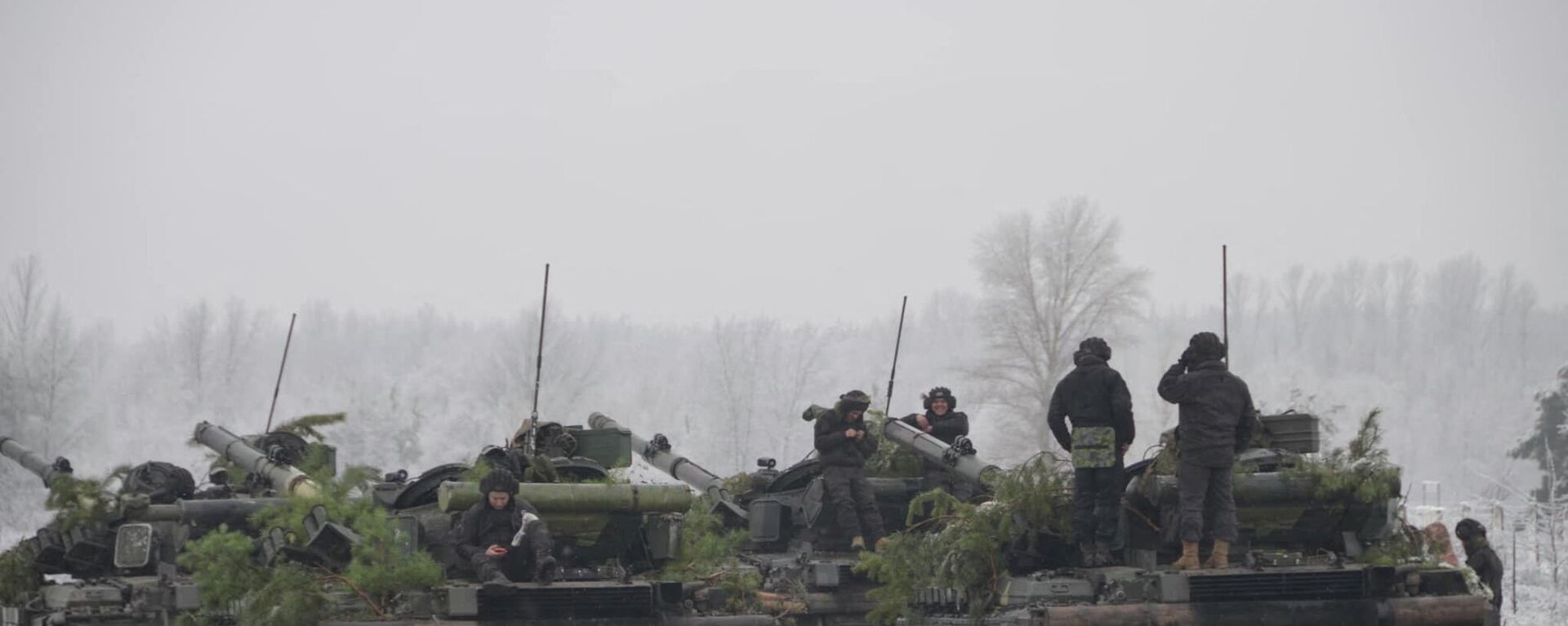
25 January 2022, 17:13 GMT
The Russian diplomat emphasised, however, that he said nothing "threatening" regarding Ukraine to his US counterpart Antony Blinken at their recent meeting in Geneva, after which the US side announced its diplomatic evacuation. “I didn’t tell him anything. I assure you that we discussed only the security guarantees, and after that I raised the completely unacceptable situation regarding our diplomatic missions,” Lavrov said.
Washington’s Ukrainian ‘Cossacks in Europe’
The Russian foreign minister accused Washington of “using” Kiev to project American interests in Europe, and stressed that Ukraine’s leaders are always welcome to come to Russia for talks if they want to try to improve bilateral relations.
“[Ukrainian President Volodymyr] Zelensky and his regime are used by the Americans primarily to escalate tension, who use their ‘Cossacks in Europe,’ who play along in every possible way in any Russophobic undertakings. And Washington’s main goal, in this case, is not about Ukraine’s fate at all. It is important for them to escalate tension around Russia in order to close this matter and move on to China, as American political scientists write,” Lavrov said.
He noted that President Zelensky is free to visit Russia if he wants to start a dialogue about normalizing relations, whether these take place in Moscow, St. Petersburg, Sochi or elsewhere. He added however that if the Ukrainian president wants to discuss Donbass, he should speak to the Donbass republics directly through the contact group. “When he says that he won’t talk to them, that’s bad. This is bad for the intra-Ukrainian crisis, and for our relations,” Lavrov stressed.
New Warning Regarding New Sanctions
New sanctions against Russia would be contrary to the West's own interests, Lavrov indicated.
“As far as the threat of sanctions is concerned: The US has been informed in the course of discussions between [Presidents Putin and Biden] that the package of measures which has now been mentioned about the complete shutdown of financial and economic systems controlled by the West would be considered tantamount to breaking off relations. This was said directly, and I think they understand this,” the Russian foreign minister stressed. “I don’t think that this would be in anyone’s interests,” he added.
Earlier this month, US media reported on the introduction of legislation in Congress aimed at "collapsing" the Russian economy, including new restrictions on the Russian banking sector, personal sanctions against military and government officials, prohibiting transactions involving Russian sovereign debt, and potentially cutting the country off from the SWIFT interbank transfer system.
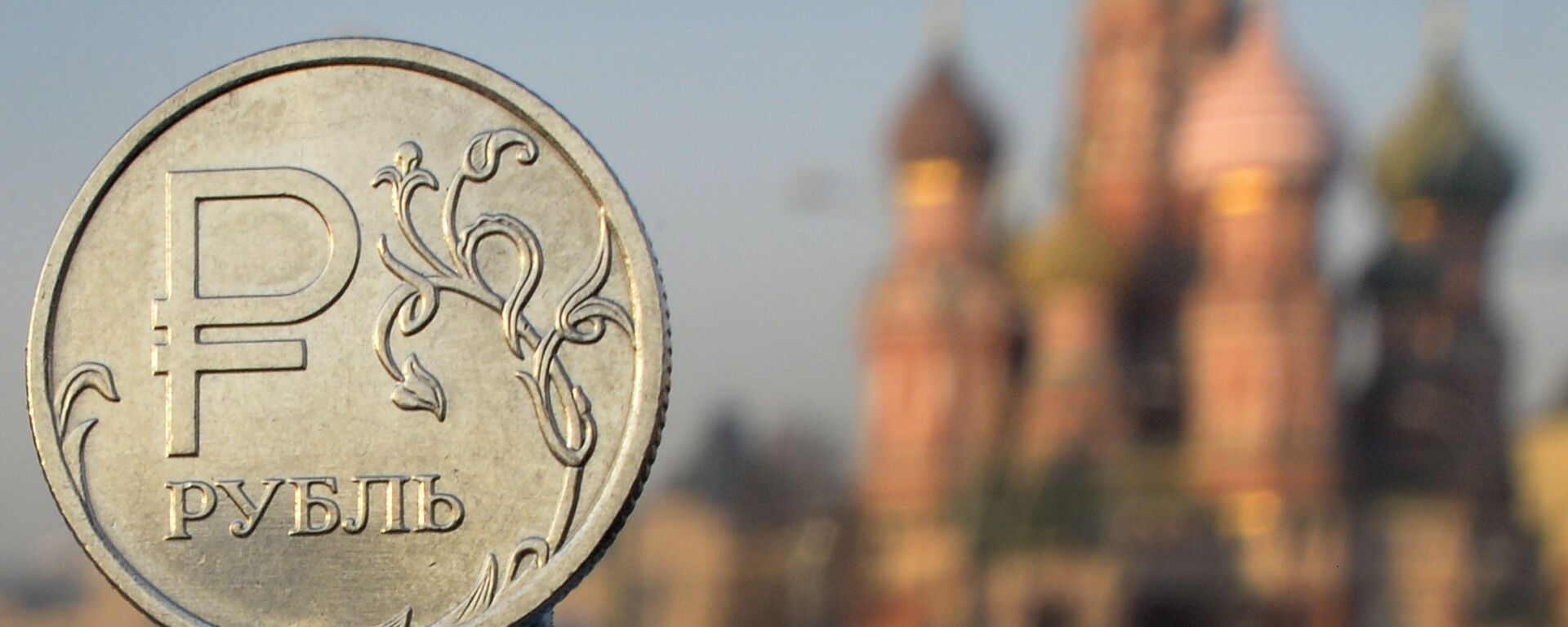
12 January 2022, 17:35 GMT
In a moment of levity during the sanctions discussion, after being informed that the US was “even” considering restrictions against Lavrov personally, the foreign minister quipped: “What do you mean ‘even’ me? What, am I not worthy of sanctions?”
Washington’s ‘Boorish’ Behaviour Toward Russian Diplomats
Lavrov also discussed difficulties that Russian diplomats have experienced in dealing with their US counterparts in recent years, recalling an undiplomatic incident that took place a couple of years ago, when, in a private conversation, an assistant to then-US Secretary of State Mike Pompeo told Lavrov’s deputy that Pompeo had mentioned a scheme to ‘optimize’ the work of diplomats, with the US reportedly considering reducing the terms of service of foreign diplomats to three years.
“To the question on why this was being announced on the sly, and whether there were similar deliberations regarding countries besides Russia, we were told ‘no’, that no other countries were considered for such an experiment, only the Russian Federation. It was then that another round of diplomatic head-butting began,” Lavrov revealed.
“We warned them that if this kind of boorishness continues, and I can’t characterise their statements otherwise, that if they didn’t immediately accept our demands for bodyguards for the ambassador, we would ask [Ambassador Anatoly] Antonov to leave the United States,” he added.
Antonov did end up leaving Washington temporarily due to a separate diplomatic flap in March of 2021 over a controversial interview with President Biden to ABC News in which the US leader agreed with the characterization of President Putin as “a killer” and threatened to make Moscow “pay a price” for its alleged meddling in US elections.
Commenting on the ongoing dispute between Russia and the US regarding diplomatic property and the number of diplomatic personnel stationed in each country, Lavrov promised that a meeting on the matter would be held within the next couple of weeks.
“We propose a reset for everything – starting with the ugly and petty move by Nobel laureate [Barack] Obama, to annul everything starting with that move and from what followed,” Lavrov said, referring to the former US president’s decision to kick out 35 Russian diplomats out of the US in late 2016 in response to claims of Russian election meddling.
Lavrov stressed that Moscow would continue to engage with and build relations with Latin American nations, no matter how the talks with the West on Russia’s security proposals turn out.
Characterising Russia’s ties with these countries as “deep,” Lavrov indicated that they “cover economic, humanitarian, educational and sports contacts. They also cover military and military-technical cooperation in full compliance with international law. I can assure you that no matter how events evolve on the issue of European security, we will progressively build on these relations.”
Earlier, US media ramped up fears that Russia might put military bases or even nuclear-tipped missiles in the Western Hemisphere, with these reports prompting US Ambassador to the United Nations Linda Thomas-Greenfield to warn that “such an aggressive action against the United States” would elicit “a strong response” from Washington.
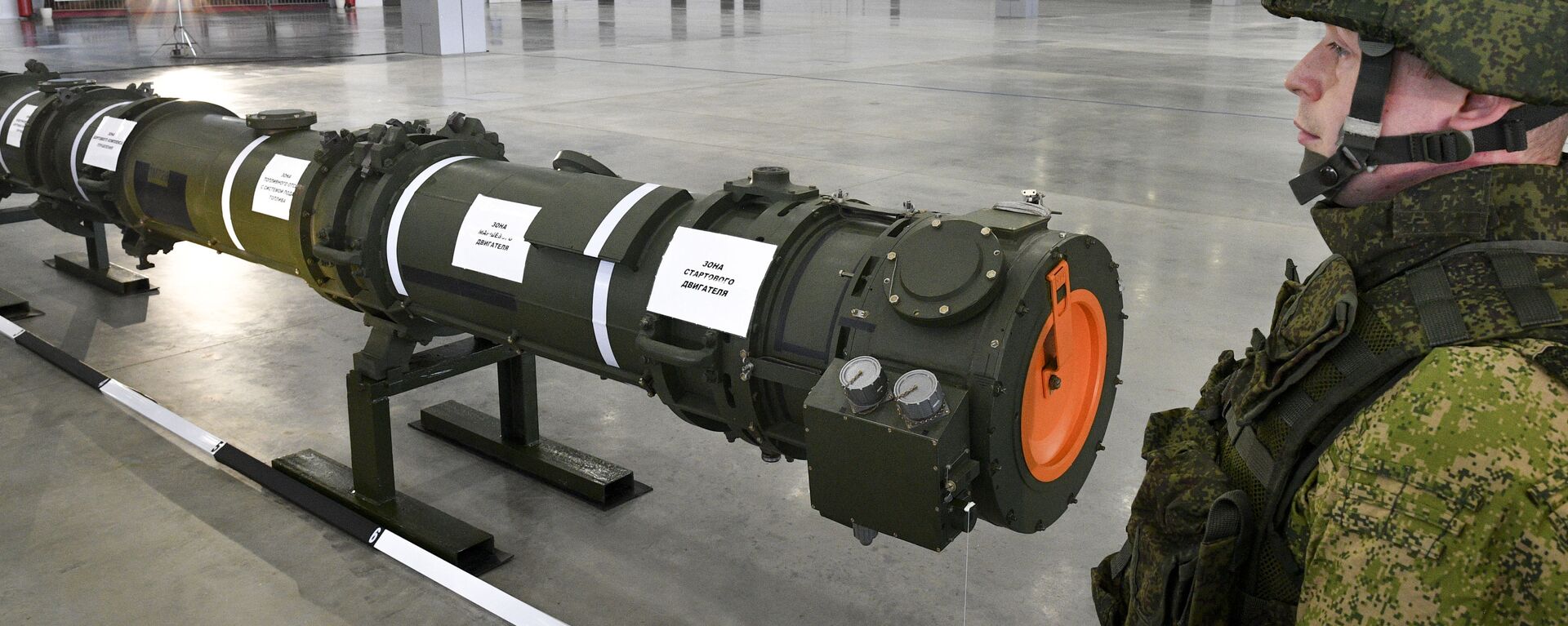
18 January 2022, 19:00 GMT
Lavrov weighed in on the saga surrounding Alexei Navalny – the Russian opposition vlogger whose alleged poisoning sparked a new escalation of tensions between the West and Moscow in 2020. Moscow, he said, still has a series of unanswered questions regarding the incident.
“Firstly, we still haven’t received an answer regarding who flew in for Alexei Navalny [when he was picked up in Siberia and taken to Berlin for treatment], and why…the plane which flew to Omsk for him was I believe ordered a day before he fell sick. Why have there been no answers to concrete questions asked about this in the Bundestag?” Lavrov said.
“There are a lot of interesting elements there,” he noted, pointing out, for example, that Navalny was visited by US intelligence officers during his stay in the Berlin hospital.
As for broader Western allegations against Russia regarding Navalny’s alleged “poisoning,” Lavrov said that he believes that “so far… the West has no cause to blame us,” and that the poisoning saga was started artificially as a deliberate provocation.
In recent weeks, the European Court of Human Rights and Russia have engaged in multiple spats on a range of issues, including Moscow's decision to close down human rights NGO "Memorial,"
the MH17 case, a Ukrainian
case about Russia's alleged "abduction of children" from the Donbass, and other problems. Lavrov commented on these developments by suggesting that unfortunately, in his estimation, the court has lost its ability to make objective judgements.
“Over the past few years, Russia has raised the question of materializing the statutory provision [on a commission of human rights], and there was general agreement to start work on such a commission, as well as a common understanding that we would primarily deal with human rights issues in the Commonwealth of Independent States area, so that we ourselves, all CIS countries, and not some Western structures, like the ECHR, would rule on these subjects. Because the EHCR lost its ability to rely on the principles of justice a long time ago, and politicises its decisions more and more with each passing year, in my opinion,” Lavrov said.
